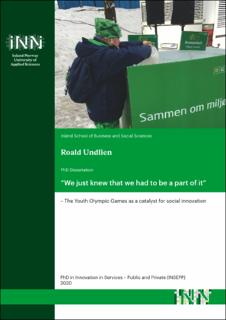| dc.contributor.author | Undlien, Roald | |
| dc.date.accessioned | 2020-06-04T09:59:41Z | |
| dc.date.available | 2020-06-04T09:59:41Z | |
| dc.date.issued | 2020 | |
| dc.identifier.isbn | 978-82-8380-174-3 | |
| dc.identifier.isbn | 978-82-8380-175-0 | |
| dc.identifier.issn | 2535-6151 | |
| dc.identifier.issn | 2535-6143 | |
| dc.identifier.uri | https://hdl.handle.net/11250/2656513 | |
| dc.description | Article 1 has been removed from the digital version due to lack of permission from the publisher. It can be read in International Journal of Sport Management and Marketing, DOI: https://doi.org/10.1504/IJSMM.2017.087438, or in the printed version of the thesis. | |
| dc.description.abstract | Denne avhandlingen undersøker hvordan frivillig arbeid ved et olympisk arrangement kan fungere som en katalysator for sosial innovasjon for mennesker med utviklingshemming.
Mennesker med utviklingshemming er vanligvis ikke en del av frivillighetskorpset ved idrettsarrangementer, og vi vet derfor lite om hva slags utbytte de kan ha av denne typen aktivitet.
Avhandlingen bidrar til å fylle dette kunnskapshullet.
Avhandlingen bidrar empirisk til frivillighetsfeltet ved å studere en gruppe utviklingshemmede frivillige, i lys av teori om «social leverage» (sosial innflytelse), sosial innovasjon og sosialt entreprenørskap. Avhandlingen er en kvalitativ casestudie, med Ungdoms-OL på Lillehammer 2016 som case. Arrangørene av Ungdoms-OL 2016 viste vilje til å inkludere alle slags mennesker som frivillige under Ungdoms-OL. Blant disse var en gruppe elever med forskjellige typer utviklingshemming ved en lokal videregående skole. Avhandlingen følger spesielt denne gruppen, som fikk i oppgave å plukke og sortere søppel på to av arenaene under Ungdoms-OL, før, under, og to år etter arrangementet. Flere aktører som jobbet for sosial endring for marginaliserte grupper, oppfattet Ungdoms-OL som en mulighet for sosialt entreprenørskap, og fikk satt søkelys på sine prosjekter ved at personer fra disse målgruppene deltok som frivillige under arrangementet. I avhandlingen er fire slike prosjekter studert.
Avhandlingen inneholder totalt fire artikler. I første artikkel studeres sosiale entreprenørers erfaringer med å bruke Ungdoms-OL som arena for sitt arbeid. Artikkel to dreier seg om hvordan en kan tilrettelegge kvalitative intervjuer for mennesker med utviklingshemming. I artikkel tre og fire presenteres studien av gruppen med utviklingshemming som deltok som frivillige. Noen av hovedfunnene er at frivillighet ved olympiske arrangementer har et potensial for å skape vinn−vinn effekter og samarbeid mellom personer eller organisasjoner som normalt ikke jobber sammen. Organisasjoner som setter søkelys på sosiale temaer på vegne av utsatte grupper, opplevde Ungdoms-OL som en egnet arena for sosialt entreprenørskap. Videre kan sosiale entreprenører dra nytte av markedsføringen og oppmerksomheten som følger i kjølvannet av et olympisk arrangement for å løfte frem (social leverage) sine prosjekter, og i sin tur skape sosial verdi for spesifikke grupper gjennom frivillig arbeid. | en_US |
| dc.description.abstract | ABSTRACT
This thesis explores how volunteering at an Olympic event can function as a catalyst for social innovation for people with intellectual disabilities (ID). People with ID are not usually a part of the sports-event volunteer context; thus, little is known about potential benefits they can access by doing so. This thesis contributes to filling this gap in the literature.
The thesis is a qualitative single-case study, using the 2016 Lillehammer Youth Olympic Games (LYOG) as its main case. The event organizers demonstrated social responsibility by displaying a willingness to include all kinds of people as volunteer participants in the LYOG, including a group of high school students with ID. This study follows, in particular, this group of volunteers with ID who were assigned to pick up garbage on two of the main venues of the LYOG. Furthermore, several other actors seeking to address social change for specific target groups perceived the event as an entrepreneurial opportunity and used it to highlight their projects through volunteer activities. Thus, four other projects that involved other marginalized groups are also partially studied.
Empirically, the thesis contributes to the field of sports event volunteering by studying a group of volunteers with intellectual disabilities through the theoretical framework of social leveraging, social innovation, and social entrepreneurship. Furthermore, through the empirical studies, appended in three articles, links to other theoretical concepts are made, including social capital and quality of life. In addition, one paper related to facilitating qualitative interviews with people with ID is included in the thesis. Some of the main findings are that volunteering at Olympic events holds a potential for cooperation between persons or organizations that do not normally cooperate, where a win–win effect can be created. Organizations addressing social issues on behalf of vulnerable groups experienced the LYOG as a suitable arena for entrepreneurial social projects, with a potential for creating social value for specific groups | en_US |
| dc.language.iso | eng | en_US |
| dc.publisher | Høgskolen i Innlandet | en_US |
| dc.relation.ispartofseries | Ph.d.-avhandlinger i innovasjon i tjenesteyting i offentlig og privat sektor (INTOP);11 | |
| dc.relation.ispartofseries | PhD Dissertations in Innovation in Services in the Public and Private Sectors (INSEPP);11 | |
| dc.title | “We just knew that we had to be a part of it” ‒ The Youth Olympic Games as a catalyst for social innovation | en_US |
| dc.type | Doctoral thesis | en_US |
| dc.description.version | publishedVersion | en_US |
| dc.subject.nsi | VDP::Samfunnsvitenskap: 200 | en_US |
| dc.source.pagenumber | 217 | en_US |
